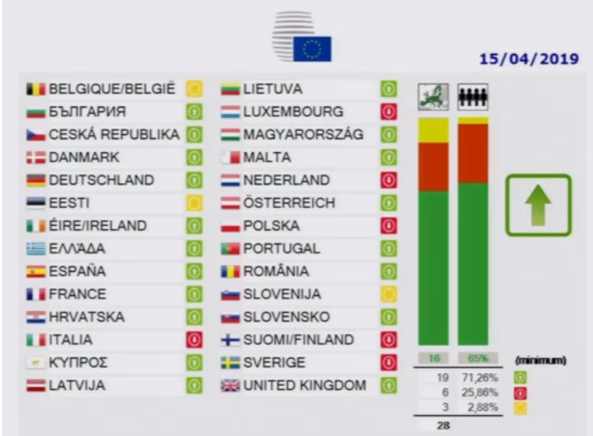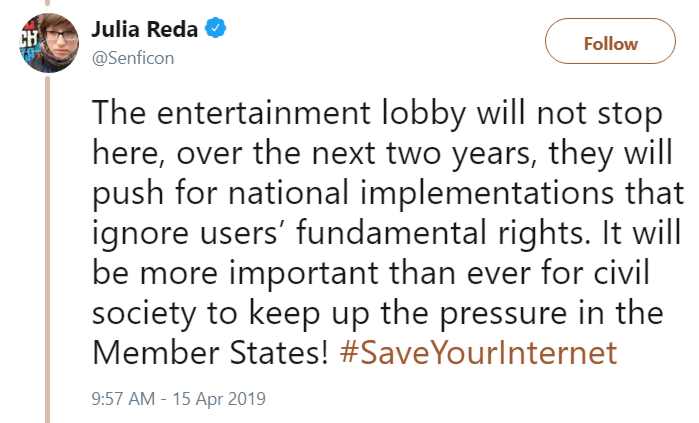| EU Copyright Directive Passed Into Law |
| Written by Sue Gee |
| Monday, 15 April 2019 |
|
The EU Council of Ministers today approved the Copyright Directive, which includes the controversial Article 17 (formerly 13). The legislation was voted through by a majority of EU ministers despite opposition from Italy, Luxembourg, Netherlands, Poland, Finland, and Sweden. When we reported on March 26th, 2019 that the EU Copyright Directive had been approved by the European Parliament, there was a glimmer of hope that it would be stopped at this final stage. To pass into law required a majority of 55% of Member States, representing 65% of the population and campaigners continued to voice their concerns with the hash tag #SaveOurInternet. This included a blackout of Wikipedia in four of its European sites. In the crucial vote on April 15th, 19 of the 28 states, representing 71.26% of the population were in favor and only 6 were against with 3 abstentions:
European Member States now have two years to incorporate the directive into their national; legislation. The EU Copyright Directive was intended to protect Europe's creative industries, which employ 11.7 million people and the European Commision's Press Release welcomes the result, stating: Today the Council of the European Union gave its green light to the new Copyright Directive which will bring concrete benefits to citizens, the creative sectors, the press, researchers, educators, and cultural heritage institutions. The reform will adapt copyright rules to today's world, where music streaming services, video-on-demand platforms, news aggregators and user-uploaded-content platforms have become the main gateways to access creative works and press articles. European Commission President, Jean-Claude Juncker stated: “With today's agreement, we are making copyright rules fit for the digital age. Europe will now have clear rules that guarantee fair remuneration for creators, strong rights for users and responsibility for platforms. When it comes to completing Europe's digital single market, the copyright reform is the missing piece of the puzzle.” According to the press release there is no reason for concern at all. It maintains: The new Directive will boost high-quality journalism in the EU and offer better protection for European authors and performers. Users will benefit from the new rules, which will allow them to upload copyright protected content on platforms legally. Moreover, they will benefit from enhanced safeguards linked to the freedom of expression when they upload videos that contain rights holders' content, i.e. in memes or parodies. Critics of the legislation remain adamant that Article 17 (formerly Article 13) which puts the onus on websites to ensure that content uploaded by users has permission from rights holders, will result in upload filters and censorship. They point out that while large sites such as YouTube will be largely unaffected, it will threaten the existence of smaller sites. The other controversial clause, the Link Tax, Article 15 in the final directive although formerly Article 11, may cause news aggregation sites to withdraw from Europe rather than face the uncertainty of lawsuites. Google has already carried out experiments to explore impact of Article 11, which indicated a 45 percent reduction in traffic to news publishers which would be particularly bad for smaller and emerging sites. Julia Reda, the MEP who has campaigned vociferously against the EU Copyright Directive isn't giving up the fight as one of her tweets today indicates: One possible way to defeat the legislation would be to have it overturned by the European Court of Justice. Reda thinks that while this might be possible . it would be slow and difficult and says that: voting for MEPs who respect our digital rights is more likely to bring change! European Parliament elections take place next month so this advice is timely. It isn't just Europe that will feel the impact of this ill-conceived legislation. One of the the Internet's strengths is being global and not restricted by borders. The unintended consequences of today's vote may affect us all in the future. More InformationEC Press Release Copyright reform clears final hurdle Related ArticlesEU Copyright Directive Approved - Without Amendments EU Copyright Directive Article 13 Now Worse Than Ever Final EU Copyright Directive Spells Disaster EU Copyright Directive Stalled Catastrophic EU Copyright Directive Approved Threat To Internet Staved Off Until September Why Article 13 Must Be Stopped Save Code Share - Urgent Action Needed
|
| Last Updated ( Monday, 15 April 2019 ) |



